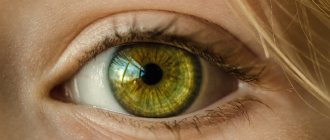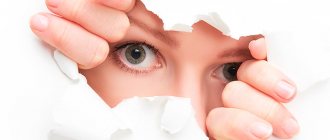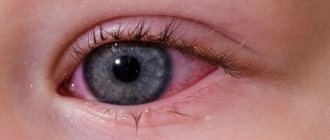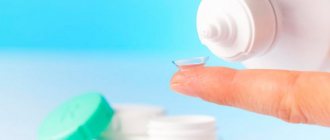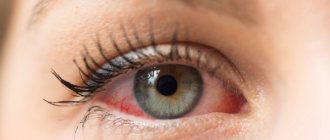My child has conjunctivitis, can I bathe him?
The answer to the question whether it is possible to bathe a child with conjunctivitis largely depends on how the disease manifests itself:
- An inflammatory process with purulent discharge, provoked by an allergy or against the background of an acute respiratory viral infection, often causes an increase in temperature. In this case, it is not advisable to give antipyretic medications if it is not higher than 38.5 degrees. You cannot wash children in this condition. You need to wait until the temperature drops. Shoulders and neck may be rubbed if required, but no bathing.
- Even if conjunctivitis proceeds calmly, without high fever, detergents (including delicate ones for children) can cause severe irritation to the eyes. Therefore, if you decide to bathe your child, it is better not to wash your face with them and avoid any contact with them.
Expert opinion
Ermolaeva Tatyana Borisovna
Ophthalmologist of the highest category, Candidate of Medical Sciences
Note! Wearing goggles on your child after taking a bath will help prevent irritation of the mucous membranes of the eyes. They will prevent the penetration of hygiene products, as well as water, which can also cause discomfort.
From the above, we can conclude that you can bathe a child with conjunctivitis, but only if he does not have a fever. It is also important to monitor the patient’s well-being; if he is too lethargic, moody, or tired, then water procedures should be abandoned.
What kind of disease is this?
Conjunctivitis is an inflammatory process that affects the mucous membrane of the eyes. May be of allergic, bacterial or viral origin.
The main signs of the disease are redness of the whites of the eyes and swelling of the eyelids. With bacterial conjunctivitis, purulent discharge is observed, with viral conjunctivitis it is clear, more liquid. In the allergic form, they are absent, only severe lacrimation occurs.
Due to irritation of the mucous membrane, photophobia occurs. That is, the eyes begin to hurt in bright light. Because of this, it is not possible to open the eyelids completely. Naturally, there is discomfort in the organs of vision, they itch, there is a burning sensation, and sometimes pain.
The disease itself is not dangerous, but if left untreated it can lead to serious complications, including blindness. To get rid of the infection, the doctor prescribes eye drops and ointments, rinses. For allergic forms, oral antihistamines are additionally prescribed.
Features of the disease in children
It can develop in both young children and adolescents. Most often it manifests itself when the immune system is weakened. The fact is that human tears have a bactericidal effect and cleanse the conjunctiva from various pathogens.
When the body's defenses are weak, the fluid from the eyes loses its properties. As a result, if an infection enters the conjunctiva, it immediately provokes an inflammatory process.
Expert opinion
Ermolaeva Tatyana Borisovna
Ophthalmologist of the highest category, Candidate of Medical Sciences
For reference! According to statistics, 80% of cases of conjunctivitis are bacterial or viral in origin. Only 20% is due to the allergic form.
Rice. 1. Conjunctivitis in a child.
Conjunctivitis – what is worth knowing?
The conjunctiva is a membrane that covers the eyeball and the inner surface of the eyelids. It performs a moisturizing function and promotes the secretion of mucus and tears. Very sensitive to any irritants - bright light or the touch of dirty hands. Accordingly, many factors lead to the occurrence of conjunctivitis. The first symptoms are itching, burning and increased sensitivity to light. The eyes become red and watery. Depending on the cause, the following types of conjunctivitis are distinguished:
- Bacterial - caused by several types of bacteria, the characteristic symptom is cloudy discharge.
- Viral – caused by viruses, manifested by visible swelling and profuse lacrimation.
- Fungal - appears after antibiotic therapy or steroid use.
- Allergic – accompanied by itching, burning and discharge.
- Chlamydial - caused by chlamydia and is almost always sexually transmitted. The mucous membranes are swollen, and purulent mucous discharge appears in the conjunctival sac.
- Non-infectious - occurs from strong wind, bright light, dust, mechanical injuries in the eye area or from chronic lack of sleep.
Conjunctivitis is not a life-threatening disease and is relatively easy to treat. However, despite this, it should not be underestimated, since without treatment it can lead to chronic inflammatory processes. If the above symptoms do not disappear after a few days, you should consult a doctor immediately.
Bathing rules
In order for water procedures to be beneficial and not harmful, you must follow the following rules:
- Before swimming, wash your eyes. To do this, you need to moisten two cotton pads (separate for each eyelid) in furatsilin, weak tea leaves or chamomile decoction. Gently rub your eyes from the inner corner to the outer corner.
- Bathe your child in the shower, do not draw a bath. Try not to pour water above shoulder level so that it does not get on your face. Pay special attention to the armpits and groin area, because... most bacteria accumulate in these areas.
- After the procedure, you should immediately dry the baby and dress him, avoiding drafts. It is best to do this in an already heated bathroom.
- After washing, let the child rest in bed under a warm blanket. It is recommended to wear warm socks.
Expert opinion
Ermolaeva Tatyana Borisovna
Ophthalmologist of the highest category, Candidate of Medical Sciences
Important! If your child is prescribed any medications, they should be given at least 30 minutes after bathing. Because water procedures can enhance their effects, which will not be beneficial.
How to wash your hair
It is advisable to avoid washing your hair if you have conjunctivitis. If there is an urgent need for this, then you can perform the procedure no more than once every 5 days. When washing your hair, avoid using shampoo; it is better to give preference to herbal decoctions. They will wash away dirt and will not harm your eyes.
Rice. 2. As an additional measure of protection, the use of swimming goggles is recommended.
Swimming in reservoirs
Natural bodies of water contain a huge number of infectious agents. They can penetrate the child’s weakened body and begin their life activities there.
This will not only slow down the treatment of conjunctivitis, but will also worsen the health condition.
Is it possible to take a bath with conjunctivitis?
Going to the bathhouse if you are ill is undesirable for the following reasons:
- there is a favorable environment for the proliferation of pathogenic microorganisms;
- high temperature and humidity worsen tear production, which cleanses the conjunctiva of pathogens;
- there is a risk of infecting others or becoming infected with an additional infection;
- high temperature promotes blood flow, which provokes even more severe inflammation;
- a weakened body may not be able to withstand the load that occurs when going to the steam room, because of this, various pathological conditions may appear.
Rice. 3. Going to the bathhouse can be resumed after the child is completely cured.
Time for a swim
Water procedures for conjunctivitis should only be a method of cleansing. Do not keep your child in water for too long.
Bathing should not last more than 10-15 minutes. It is best to wash your baby in the evening before bed, so that he can then go straight to a warm bed.
Bathing and feeding
Babies should not be bathed on an empty stomach because they will be fussy. If the baby is breastfed, you can feed him and immediately go to wash, and do this immediately after water procedures.
This is due to the fact that breast milk is better absorbed. If the baby is bottle-fed, then you need to wait at least 30 minutes between food and bathing. The same applies to children who are already eating adult food.
Bathing in the herbs
For conjunctivitis, it is recommended to wash the child not with ordinary water, but with a decoction of medicinal herbs. For example, from chamomile, string, nettle, oak bark. These plants have antiseptic and antibacterial effects. How to cook:
- 2 tbsp. l. herbs pour 0.5 liters of boiling water.
- Leave for 2-3 hours.
- Strain and add to bathing water.
Expert opinion
Ermolaeva Tatyana Borisovna
Ophthalmologist of the highest category, Candidate of Medical Sciences
Note! As mentioned earlier, it is not advisable to put a child in the bathtub. Therefore, the broth is added to a basin or bucket with plain water. It is taken from there with a ladle and used for rinsing.
Features of bathing children with conjunctivitis
There is nothing special about this process; in fact, it is no different from regular bathing, with the exception of a few small moments.
- Before bathing, be sure to clean the child’s eyes from crusts and pus - they should not get into the general water when bathing.
- For infants, do not be too lazy to boil water for bathing and then cool it until needed. You won't completely submerge the child, but the splashes may accidentally get on the child's face, so it's better to be on the safe side.
- Right now, baths with decoctions of medicinal herbs with a calming, anti-inflammatory effect will be more useful than ever. Chamomile, nettle, string, oak bark are suitable. To prepare a herbal infusion, just pour two tablespoons of the raw material into 500 ml of boiling water and leave for two to three hours. The resulting infusion is then poured into the water prepared for bathing.
- Infants are bathed by holding them in their arms and on a special lining so that the head is constantly above the water. Diving is now strictly prohibited. Particular attention is paid to the groin area and armpits.
- If you need to wash your child’s hair, this is done very carefully, with a minimum amount of detergent, so that the foam does not accidentally get into the child’s sore eyes. It is better if relatives and friends help: grandmother, father, sister. One person supports the baby and gently soaps the head, while the other person pours water on the head to remove the soap.
- It is better to wash older children in the shower. The child should only be wetted up to the level of the shoulders and neck. If you need to wash your hair, it is better to put on special glasses for your child, which you take with you to the sea or river for diving under water. Children usually perceive this as a fun game and do not resist.
- After bathing, the child is wiped dry with a soft towel; it is better to simply wrap infants in a diaper and blot the body. It is important to ensure that there are no drafts in the room: even if the disease is already at the final stage, an accidental draft can trigger its relapse. Immediately after bathing, the child is dressed in clean, dry clothes; in the cold season, a hat and socks are required.
Baths with medicinal herbs will be especially useful for a baby suffering from conjunctivitis.
Attention! No facial cosmetics, even hypoallergenic ones for children, should be used during conjunctivitis, even at a subsiding stage. It is also not advisable to lubricate the child’s body with oil or cream: the baby may rub his hands first on his legs or tummy, and then on his eyes, before you have time to keep track. Therefore, in order not to provoke unnecessary irritation and not add problems to yourself and your baby, it is better to refrain from using children’s cosmetics until complete recovery.
What can and cannot be done during illness?
As it became clear, the answer to the question of whether it is possible to swim with conjunctivitis is positive. Also, it is not only possible, but also necessary to take your child for a walk. However, only if he does not have a fever.
It is also necessary to avoid going outside in too windy or frosty weather, because... such conditions will worsen health conditions. When walking in the sun, you need to protect your eyes from light, for example, with dark glasses or a stroller visor.
During illness, it is prohibited to make independent attempts to cure the child. Therapy for the inflammatory process depends on its form, which only a doctor can accurately determine. In addition, medications for the treatment of the disease have contraindications and side effects; their use without a doctor’s prescription can be dangerous.
Attend school or kindergartens
If you have conjunctivitis, you should not take your child to kindergarten or send him to school. This is due to the fact that the bacterial and viral forms are contagious and are transmitted through household and airborne transmission.
That is, through contact with other children, you can infect them. In addition, during the inflammatory process, the child’s body is weakened and is more susceptible to various infections. Therefore, other diseases may also begin to develop.
Is it possible to use the pool?
If you take your child to the pool during an inflammatory process, the following may happen:
- chlorinated water will cause even greater irritation;
- the child will infect others (the exception is allergic conjunctivitis);
- due to weakened immunity, the patient may become infected with other pathogens.
Rice. 4. As it became clear, if there is an inflammatory process in the mucous membrane of the eyes, you will have to refuse to visit the pool.
Reasons for restrictions
The disease is infectious in nature, and therefore an adult should be especially careful when washing a newborn or small child. You should not touch the mucous membranes of the eye, and you must also thoroughly disinfect your hands after the water procedure.
Ophthalmologists note that most often conjunctivitis spreads through the touch of dirty fingers, towels to the eyes and through the use of other people's hygiene or cosmetic products. The infectious nature of the disease contributes to the rapid spread and infection of other people. And also, when moisture gets into the organs of vision, a natural reaction is the desire to rub the eyes, but this will provoke a worsening of the condition and an increase in negative symptoms. There is a high risk of additional infection. Running tap water may contain bleach and pathogenic microorganisms, which are especially dangerous for inflammation of the mucous membranes of the eyes in children and adults. If you take a shower, you may experience the following symptoms:
- purulent and mucous discharge;
- deterioration of visual abilities;
- itching and burning;
- acute pain syndrome;
- sensation of a foreign object in the eyeball;
- slowing down the regeneration process.
Prevention
It is easier to prevent any disease than to treat it for a long time. To avoid infection with conjunctivitis, you need to follow these simple rules:
- walk in the fresh air more often, away from industrial enterprises and highways;
- maintain personal hygiene (wash hands more often, use individual household items, etc.);
- Clean the rooms every day and ventilate them several times a day;
- limit contact with allergens, people who show signs of colds and conjunctivitis;
- provide rational nutrition;
- carry out daily exercises and hardening procedures;
- wash your eyes as a preventive measure;
- promptly treat colds and other eye lesions.
Expert opinion
Ermolaeva Tatyana Borisovna
Ophthalmologist of the highest category, Candidate of Medical Sciences
Note! The listed precautions cannot give a 100% guarantee that the child will get sick, but they will significantly reduce the risk of the inflammatory process.
Our address
Center for Eye Microsurgery, Ulyanovsk, Radishcheva St., 109/18A (stop “Tukhachevskogo Street”) Telephone: 8(8422) 50-50-70 8(8422) 51-00-30 Opening hours: MONDAY - FRIDAY from 9.00 to 18.00
Zavolzhsky branch Ulyanovsk, New City Penzensky Boulevard 5 Telephone: 8(8422) 50-50-70 8(8422) 51-00-30 Opening hours: MONDAY - FRIDAY from 9.00 to 18.00
Source
Signs of eye conjunctivitis and how it is treated
Conjunctivitis is a process of inflammation of the conjunctiva of the eyeball. In most cases, the disease causes inflammation of the eyelids.
Possible consequences
If you ignore the disease, complications will likely arise. The most severe of these is considered to be the occurrence of keratitis, complications of which contribute to loss of vision. It can even lead to meningitis. In order to avoid harmful consequences, you should immediately seek help from an ophthalmologist when the first symptoms of inflammation of the organs of vision appear.
Answers to popular questions
Patients often have similar questions regarding this disease. Here are some of them.
What is the ICD10 code for conjunctivitis?
- H10 Conjunctivitis
- H10.0 Mucopurulent conjunctivitis.
- H10.1 Acute atopic conjunctivitis.
- H10.2 Other acute conjunctivitis.
- H10.3 Acute conjunctivitis, unspecified.
- H10.4 Chronic conjunctivitis.
- H10.5 Blepharoconjunctivitis.
- H10.8 Other conjunctivitis.
- H10.9 Conjunctivitis, unspecified.
Is it possible to warm the eye if you have a disease?
Conjunctivitis is accompanied by inflammatory processes, and heating the site of inflammation will lead to increased inflammation. Therefore, warming your eyes is prohibited.
What is the difference between conjunctivitis and stye?
Barley is an acute infectious disease that is accompanied by inflammation of the edge of the eyelid. Purulent discharge does not come from the eye as with conjunctivitis, but from the inflamed edge of the eyelid. Conjunctivitis is accompanied by more severe inflammation and increased tearing.
Is it possible to wash with conjunctivitis?
Bathing will not be affected by this disease, but the water should be clean and not from the tap. This is due to the fact that the pipes through which water is supplied contain many bacteria and this can cause additional complications.
Is it possible to wear makeup if you have conjunctivitis?
It is advisable to avoid cosmetics during treatment. Not only can this cause additional infection and pain, but you will also have to throw away all used cosmetics so as not to get infected again.
Can conjunctivitis go away on its own and what will happen if it is not treated?
This is only possible if conjunctivitis is allergic and caused by an allergen that has no longer affected the body. In any other case, it can become chronic, so it must be treated.
What is the incubation period for conjunctivitis?
The duration of the incubation period of the disease is from three to fourteen days.
Is it possible to work at a computer with conjunctivitis?
Sitting at a computer is possible, but not advisable. It all depends on the form of the disease.
Also read: How to preserve your eyesight when working on a computer
Is it possible to drink alcohol during treatment?
Drinking alcohol during treatment is strictly prohibited. This is especially true when antibiotics are prescribed.
Source: https://vashe-zrenie.ru/bolezni-glaz/konyunktivit/o-bolezni.html
Possible consequences
Allergic conjunctivitis, like any other manifestation of allergies, is a chronic disease. With proper treatment of allergies, AK may not appear for a long time, but the general mood towards allergies will still remain.
If left untreated, the disease is often complicated by a bacterial infection. Sometimes concomitant eye diseases worsen, for example, glaucoma or keratitis.
Specific prevention measures that could prevent the development of AK have not yet been developed, since the causes and mechanisms of allergy development are still not entirely clear.
Methods of secondary prevention, which help prevent relapse of an existing disease, involve minimizing contact with the allergen and carrying out adequate therapy.
Was the page useful? Share it on your favorite social network!
In what cases should you not bathe?
In this case, bathing can only make the situation worse. Also, you should not bathe a little person if there is an elevated temperature and purulent discharge from the eyes.
Until these symptoms go away, it is recommended to use wet wipes and towels to wipe the skin.
As for swimming in pools , this is not prohibited in principle if you have conjunctivitis .
But you must understand that water can become a source of infection for other people, since the infection spreads well in the aquatic environment.
Chlorination of water cannot be a guarantee of safety, and in addition, the substances included in the disinfecting liquid can dry out the mucous membrane of the eyes, which will negatively affect the course of the disease.
When asked whether a patient with conjunctivitis can visit a bathhouse, doctors answer in the negative .
There is also a risk of infecting other people or contracting a secondary infection.
If you have conjunctivitis, it is forbidden to swim in bodies of water .
Diagnosis and treatment of allergic conjunctivitis
Diagnosis of the disease does not take a doctor a lot of time. A visual examination of the patient is enough to make the correct diagnosis and prescribe treatment.
The doctor finds out the reasons for the development of conjunctivitis: what circumstances preceded the development of the disease, whether the patient has any allergies, whether the patient has any chronic diseases.
For example, if a patient suffers from allergies, it is logical to assume that he has allergic conjunctivitis, if he has recently had a sore throat - bacterial conjunctivitis, and so on.

